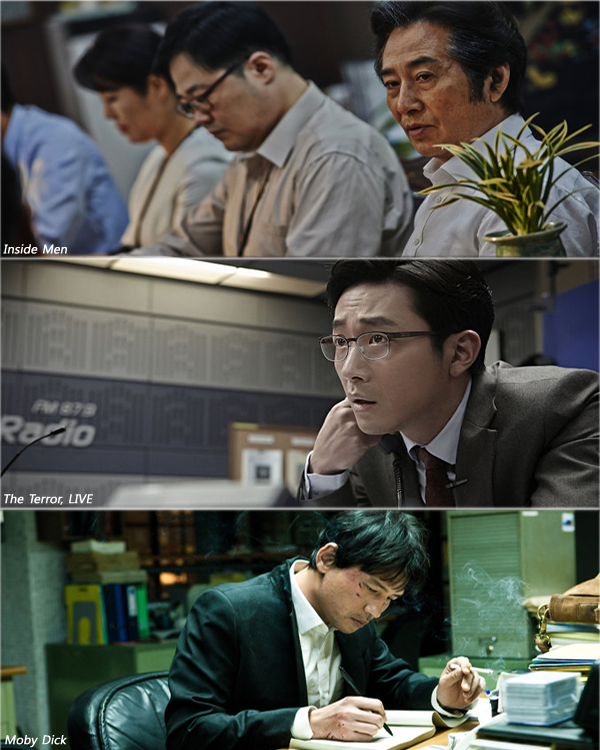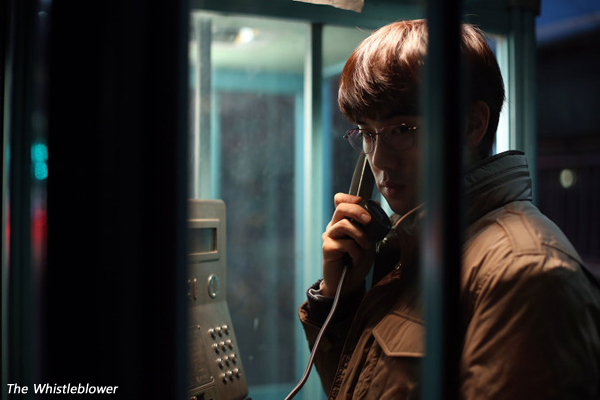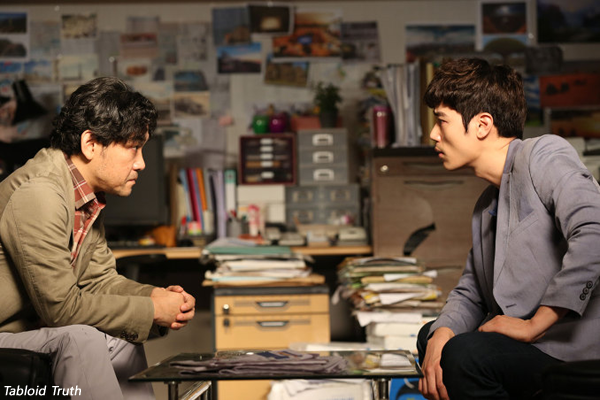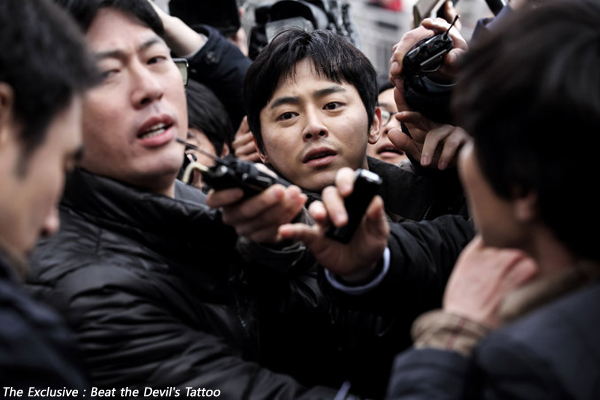hankyoreh
Links to other country sites 다른 나라 사이트 링크
[Cine feature] The light and the shadow of the press depicted in Korean cinema

Korean cinema has recently found a new subject matter-the press and journalists. Out of a few possible causes, there are two factors that must have attributed to such trend.
First of all, Korean genre films are being increasingly diversified. Of course, that does not mean that there are more films these days which present great generic achievements. It means more that the press and journalists are being presented in genre movies more frequently, as filmmakers have come to search for generic film materials that are more interesting and unique in order to ensure commercial success. It owes to the fact that there are not many other materials that are more attractive than the press' social realm, when a setting is needed for a thriller or a comedy that centers around truth and falsehood.
Secondly, such trend can be attributed to the general mistrust of people on Korean media. Once they are under impression that the press is failing in its role, they naturally get to start stretching their imagination-why not make a film that reveals the press' dark aspect of corruption and has generic attractiveness at the same time?
Justice Is too far to be achieved
In Moby Dick (2011), the film that practically triggered the recent trend of Korean films to center around the press and journalists, the main character who tracks down the incidents is a talented journalist full of the spirit of justice. In other words, the early image of the press in Korean cinema was quite a positive one, not the one that's dark and corrupted. Centering around a conspiracy theory that there is an organization that controls the whole country on top of the government, it is a story of a journalist (Hwang Jung-min) at the forefront who seeks the truth behind.
In terms of style, Moby Dick was somewhere between Bong Joon-ho, Choi Dong-hoon and NA Hong-jin; and in terms of narrative, the appearance was pretty close to that of Hollywood conspiracy films. All in all, Moby Dick successfully put the disturbing aspects of society in a genre frame. However, one thing was already fore-warned by Moby Dick: If you are to pursue justice, you either fail, or even if you succeed, that is at the expense of suffering from serious threat and danger.
The Whistleblower (2014) directed by Yim Soon-rye shows a great example of such fear. Or, rather, this film shows how such threat and danger may arise within, that is, within the media industry, not from outside. This film is based on the famous true story of Dr. Hwang Woo-suk, who faked his own study and announced in fraud the successful research on stem cells, trying to deceive the whole nation. Back then, almost all the media focused on the great value of this research and neglected the actual facts.
On the contrary, when a few of them actually did question the validity of Hwang’s work, the majority kept silent or even actively oppressed the minor opinion. Just like Hwang did in reality, Dr. Lee Jang-hwan (Lee Gyoung-young) in The Whistleblower also manipulates the press to hide his lies. Against all these, Yoon Min-chul (Park Hae-il), a TV producer, and the whistle blower (Yoo Yeon-seok) fight to secure the truth with all their might. The Whistleblower shows how excessive patriotism deforms the truth and how media further deteriorates it.
The press in a trap
Tabloid Truth (2014) focuses on a certain type of news circulation in Korea, rather than adapting on a specific story. The film deals with negative effects that so-called "zzirashi" (tabloid rumor), private and anonymous news sources, often from the stock and bond market. News and information from zzirashi, ranging from celebrity gossip, entertainment business, politics and economy, are shared by sports newspaper and National Intelligence Service staff, then most media spread them indiscreetly, which then go viral through SNS.
The film begins its imagination somewhere in that process. For example, a man (Kim Gang-woo), whose life is messed up because of a zzirashi, digs the hidden world of zzirashi. The plot is that this man meets a former journalist (Jung Jin-young), who is now the zzirashi distributor (and later reclaims his vocation as a journalist), and works with him to restore the justice. However, the size and the scope of the zzirashi industry are beyond their imagination and their success is not at all easy. Tabloid Truth shows a dramatic narrative full of tension, depicting the zzirashi industry that creates all kinds of rumors and shakes the Korean society.
Perhaps the adverse effect and/or the trend of zzirashi have to do with the press' obsession with getting scoops. An exclusive can be a great honor for journalists, but at the same time, that may put them in deep trouble, making them forget what their job really stands for.
The Terror, LIVE (2013) is a film on that aspect of the press. The main character (Ha Jung-woo), who was once a main news anchor at a TV station but is currently transferred to a small radio program, gets a phone call from a terrorist in the middle of a live show. He attempts to promote his status by hosting a live footage of the terrorist. But the terrorist also has his own plan, which leads to unexpected outcomes.
What really stands out in The Terror, LIVE is that in depicting the bitter reality of the obsession with scoops, it successfully relates to the bigger picture of the government, society and their flaws. Further, this film keeps up with the tension and pleasure of the genre. Using several cameras at the same time, the shooting is realistic, and the editing is very speedy. Towards the last part of the film, the audience should realize that what seems to be a trivial and private incident can be in fact a symbolic social news.
At the crossroad of truth and falsehood

The flaw, corruption and the dark sides of the press are the basis of two recent Korean films: The Exclusive : Beat the Devil's Tattoo (2015); and Inside Men (2015). The former once again uses the obsession with getting exclusives. However, this time, it is a comedy. A reporter, desperate for an exclusive, mistakes lines from a Chinese novel as he misbelieved that they were excerpted from a real serial killer's diary, and publishes a wrong story, which leads to trouble. Director Roh Deok explains that the reason why the main character (Jo Jung-suk) is depicted as a reporter is because she "thought the last person to tell a lie is a reporter, being at the crossroad of truth and lies." (Cine 21, vol.1027) It also implies that what we call the obsession for exclusives is situated within our everyday conflict of truth and falsehood.
The issue of "truth and falsehood" is now being used as part of a gangster movie, which has become a traditional genre in Korean cinema. The case is the same in Inside Men, featuring Lee Byung-hun, Cho Seung-woo and Baek Yoon-sik. Here eeE plays a political hoodlum, while Cho and Baek play a prosecutor and a journalist respectively.
Baek is a columnist at a prestigious newspaper. He plays a corrupted journalist who manipulates and leads the public opinion. However, he is not much different from a political hoodlum in a way. Director Woo Min-ho said at an interview: "There is a saying that goes something like, make political dramas like gangster movies, and the vice versa, to make them exciting pieces. It would be great if the audiences can realize that there are things that we should not neglect. We have to constantly keep an eye on those in power. They won't act so bluntly, if kept being looked at. And what should be at the forefront is the press. To be sure, some of them write stories in wrong frames like in Inside Men. I wanted to tell the audience that we should develop our own appreciation not to fully trust what the press shows, but to tell the truth from lies on our own." (Cine 21, vol 923).
This trend, which aims to help the audience realize social justice within the frame of genre movies, would continue in Korean cinema with the films depicting the dark side of the press.
By Kim Hyung-seok, Cine21 reporter
- See more at: http://www.koreanfilm.or.kr/jsp/news/features.jsp?pageIndex=1&blbdComCd=601013&seq=277&mode=FEATURES_VIEW&returnUrl=&searchKeyword=
These contents were reproduced with the permission of Kofic, which holds all copyright.
Editorial・opinion
![[Column] Life on our Trisolaris [Column] Life on our Trisolaris](https://flexible.img.hani.co.kr/flexible/normal/500/300/imgdb/original/2024/0505/4817148682278544.jpg) [Column] Life on our Trisolaris
[Column] Life on our Trisolaris![[Editorial] Penalties for airing allegations against Korea’s first lady endanger free press [Editorial] Penalties for airing allegations against Korea’s first lady endanger free press](https://flexible.img.hani.co.kr/flexible/normal/500/300/imgdb/original/2024/0502/1817146398095106.jpg) [Editorial] Penalties for airing allegations against Korea’s first lady endanger free press
[Editorial] Penalties for airing allegations against Korea’s first lady endanger free press- [Editorial] Yoon must halt procurement of SM-3 interceptor missiles
- [Guest essay] Maybe Korea’s rapid population decline is an opportunity, not a crisis
- [Column] Can Yoon steer diplomacy with Russia, China back on track?
- [Column] Season 2 of special prosecutor probe may be coming to Korea soon
- [Column] Park Geun-hye déjà vu in Yoon Suk-yeol
- [Editorial] New weight of N. Korea’s nuclear threats makes dialogue all the more urgent
- [Guest essay] The real reason Korea’s new right wants to dub Rhee a founding father
- [Column] ‘Choson’: Is it time we start referring to N. Korea in its own terms?
Most viewed articles
- 160% of young Koreans see no need to have kids after marriage
- 2New sex-ed guidelines forbid teaching about homosexuality
- 3[Column] Life on our Trisolaris
- 4S. Korea discusses participation in defense development with AUKUS alliance
- 5Hybe-Ador dispute shines light on pervasive issues behind K-pop’s tidy facade
- 6Months and months of overdue wages are pushing migrant workers in Korea into debt
- 7[Reporter’s notebook] In Min’s world, she’s the artist — and NewJeans is her art
- 8Presidential office warns of veto in response to opposition passing special counsel probe act
- 9Japan says it’s not pressuring Naver to sell Line, but Korean insiders say otherwise
- 10[Editorial] Penalties for airing allegations against Korea’s first lady endanger free press